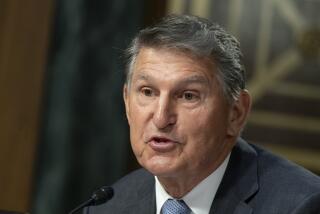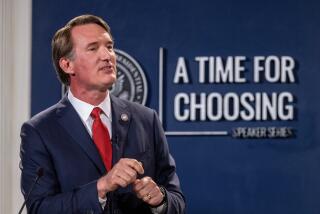Wilder Bows Out of Virginia Senate Race : Politics: He accedes to Democrats’ wishes. They hope the end of his independent candidacy will boost Sen. Robb’s campaign against Oliver North.
- Share via
WASHINGTON — Former Virginia Gov. L. Douglas Wilder withdrew from the U.S. Senate race in Virginia on Thursday, apparently bowing to the wishes of Democratic leaders convinced that his campaign could boost Republican Oliver L. North’s chances to take the seat from incumbent Democrat Charles S. Robb.
Democratic powerbrokers, including Vice President Al Gore, and personal friends of the state’s first black governor had passionately urged Wilder to give up his bid for the sake of the party, which is struggling to retain control of the Senate. The former Democratic governor had waged an independent campaign for the Senate seat.
“I have seen that the two-party system in Virginia is strong and that the difficulty in financing independent candidacies is real,” Wilder said in a statement. “I am a realist. I know when to hold them and when to fold them.”
*
Whether his withdrawal will be enough to boost Robb’s lukewarm campaign is far from certain, however.
“Yesterday North was a narrow favorite; today Robb is a narrow favorite,” said Larry Sabato, professor of government at the University of Virginia. “I think Robb is a shaky favorite. He’s seen as having a relatively weak record and being closely tied to Clinton, who is enormously unpopular in Virginia.”
Robb’s admitted extramarital relationships do not help him either, Sabato said.
Robb seemed to be buoyed by the news of Wilder’s withdrawal.
“Gov. Wilder is a formidable candidate, a formidable campaigner and adversary,” Robb said while touring an elementary school in Alexandria, the Associated Press reported, “and having him no longer on the other side gives me an opportunity to bring together all the pieces of the Democratic coalition.”
Recent polls, before Wilder dropped out, showed North and Robb neck and neck, each with support from about one-third of the electorate. But North so far has had the momentum. In early polls, his share was as low as 21% or 22%.
“It’s our ball. The question is whether we move it up the field fast enough,” said Glen Bolger, North’s pollster.
Virginia Republicans said that, since polls showed Wilder’s support to be small and shrinking, his withdrawal will not have the impact Democrats hope it will.
Polls conducted just before Wilder’s withdrawal showed him with only 12% or 13% support. Republican J. Marshall Coleman, who is also running as an independent, had a slightly smaller share.
Dave Johnson, executive director of the Republican Party of Virginia, said that Wilder and Coleman “were fastly becoming irrelevant.”
While far from confident, North’s supporters have one clear advantage over Robb’s backers, analysts said. Both candidates are opposed by large portions of the population but North, at least, has a core group of very energetic supporters.
“There’s not much enthusiasm, period, for Robb,” Sabato said.
But in Robb’s favor, the negative sentiment against him is not as strong as it is against North. A recent poll showed that 41% of undecided voters consider North an unacceptable choice, while 28% see Robb that way.
“For many voters, their evaluation of Oliver North starts and ends with Iran-Contra,” said John McGlennon, a professor of political science at the College of William and Mary in Williamsburg, Va. “Almost half of the voters say under no circumstance would they vote for North.”
Robb will be likely to pick up the support of black Virginians, who make up about 18% of the electorate and are attracted to Robb because of his record as governor and that of his father-in-law, former President Lyndon B. Johnson.
More to Read
Get the L.A. Times Politics newsletter
Deeply reported insights into legislation, politics and policy from Sacramento, Washington and beyond. In your inbox three times per week.
You may occasionally receive promotional content from the Los Angeles Times.










